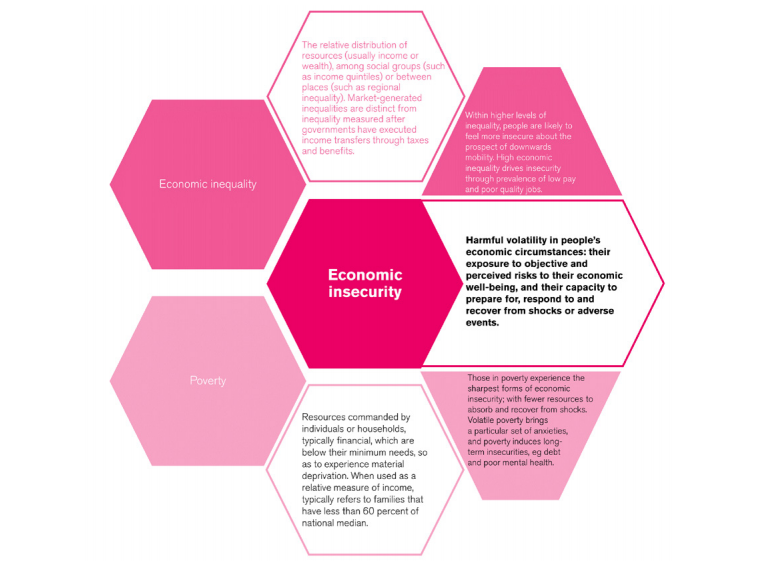
Economic Security can be defined as “the degree of confidence that a person can have in maintaining a decent quality of life, now and in the future, given their economic and financial circumstances.”
So far, being economically secure is more related to a state of mind rather than mere figures. It is then a measure of quality, where an individual can reach the best quality of life within its provided income as well as a professionally satisfied sentiment.
In fact, through that definition we can see how a key social factor is now part of the concept of economic security, which has been left aside on previous researches. It adds anunderstanding of the subjective experience of insecurity to more traditional measures that focus on job security alone.
So, for example, when someone is in work with insufficient ability to meet their family’s care and income needs, with little prospect of developing and progressing, with a disempowering working life, they could be seen as experiencing insecurity when narrow measures such as ‘job security’ might miss the reality of the situation they face.
And yet, work alone is not enough
But also it is harsh to fully understand a person and household’s well-being just by knowing what work arrangements someone has.
That inaccuracy turns to insecurity, which is faced by many more people than it was previously thought. Until now, institutions used to handle data research to measure living standards, out of that data they would draw lines for when poverty starts or valuing low unemployment rates as a good happiness index.
However, reality is quite different and despite pay rises in the UK, according to new National Living Wage standards, and alongside record employment rates, the economic insecurity has become a main problem for the citizens.
To find out what might be the causes of this rising economic insecurity, London based RSA have released a research about it.
In it, they highlighted that the “so-called ‘atypical’ contracts (essentially, non-full time employment) have grown. Wage levels have stagnated – albeit with some growth at the lower level due to the new National Living Wage. In part, this reflects low overall productivity growth. In-work poverty has grown to the extent that it is now more common than out-of-work poverty. Social mobility is stagnant or even sliding backwards. Inequality within the UK remains high compared to other similar societies. And the experience of the modern welfare state is often a harsh one.”

‘Addressing Economic Insecurity’
The RSA’s paper, Addressing Economic Insecurity, gathers convincing evidence that economic security is far broader and the challenges, for individuals, communities, firms and policy-makers far greater than we as a society have seriously focused upon. The impacts on the individual of insecurity are greater in terms of their opportunity, health and well-being. And the economic costs can be great as individuals can become stuck in low pay and precarious forms of work. So we pay a heavy price for failing to confront economic security where it causes most harm.
At the RSA think that “economic security matters alongside more traditional policy goals such as employment, inequality and poverty. Furthermore, a focus on these other goals, whilst very important, is insufficient. Economic security itself should become a prime focus of national debate, policy and institutions.”
An they provide a few examples why:
-
Unlike poverty or even inequality, the idea of economic security and insecurity is one to which most people – including many families with above average incomes – relate.
-
Economic security, and hence a person or households opportunity and prospective well-being, cannot be understood purely as a data-based designation but as something which combines objective factors and subjective experience and expectation. Two people with the same jobs and the same income can both have, and feel they have, very different prospects.
-
The economic price to be paid as a result of economic security results in a vicious circle. Unless there is security, progression in work and life become difficult, and this in turn has a cost in terms of economic growth and productivity. That then makes it difficult to ensure further policy measures to support economic security through investment in people, places and services become more difficult to sustain.
Ultimately, economic security is not just about income but about assets, resilience, adaptability, confidence, support – from the family to the state. The state can create the conditions for economic security but individuals and families must make the right choices too. Community, place and identity as well as personal finances are key factors shaping life chances and wellbeing. So policy can only go so far.

Policy is key part though as all decisions made by them will in the end affect citizens. Insecurity should be bear in mind when policing despite other factors, because insecurity might be an invisible force, latent, that moves people to do unexpected things.
Take the case when former chancellor George Osborne went into the right direction when asked why UK citizens voted to leave the EU.
“I don’t think I properly understood the alienation that many people felt, not just from the European Union, but from the establishment, the system of government. That economic insecurity and that loss of identity in many of our communities was something that we had not properly addressed,” he stated.
To conclude, economic security can definitely be a great qualitative measure particularly when it includes concepts such as its impact on well being, adaptability, confidence and support.

Hernaldo Turrillo is a writer and author specialised in innovation, AI, DLT, SMEs, trading, investing and new trends in technology and business. He has been working for ztudium group since 2017. He is the editor of openbusinesscouncil.org, tradersdna.com, hedgethink.com, and writes regularly for intelligenthq.com, socialmediacouncil.eu. Hernaldo was born in Spain and finally settled in London, United Kingdom, after a few years of personal growth. Hernaldo finished his Journalism bachelor degree in the University of Seville, Spain, and began working as reporter in the newspaper, Europa Sur, writing about Politics and Society. He also worked as community manager and marketing advisor in Los Barrios, Spain. Innovation, technology, politics and economy are his main interests, with special focus on new trends and ethical projects. He enjoys finding himself getting lost in words, explaining what he understands from the world and helping others. Besides a journalist, he is also a thinker and proactive in digital transformation strategies. Knowledge and ideas have no limits.












